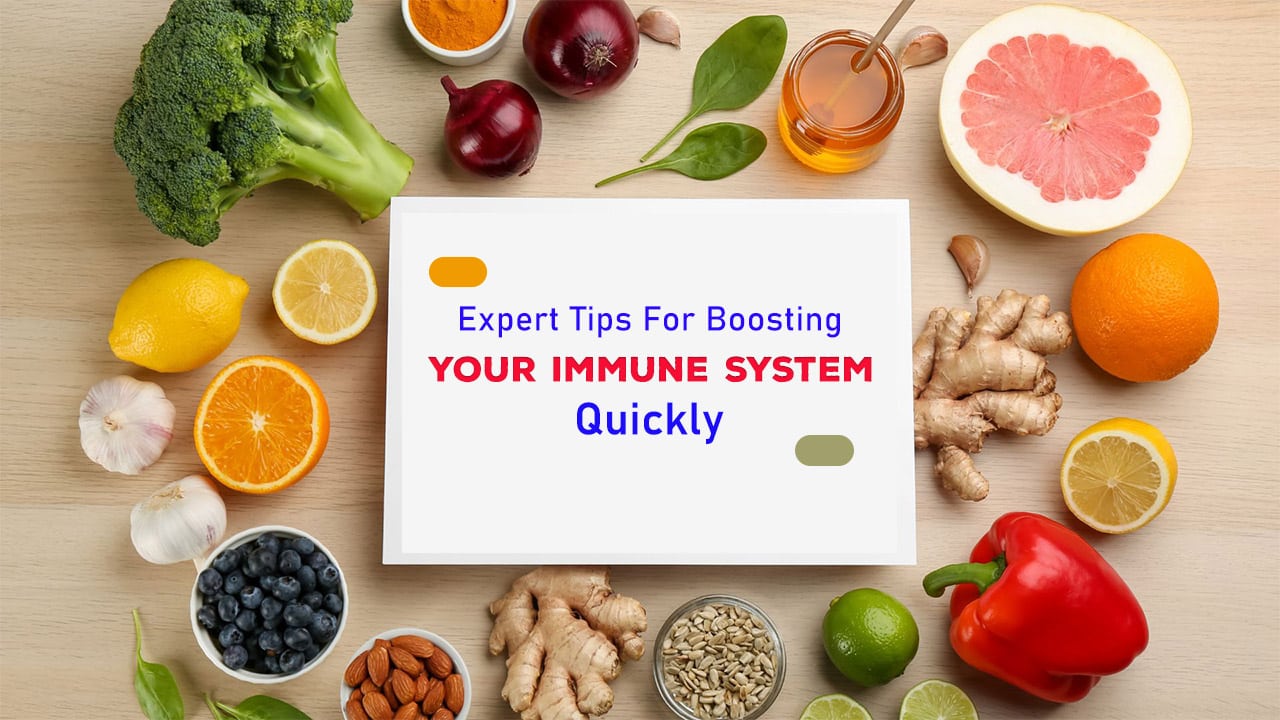Maintaining a robust immune system has never been more critical in a world where health threats constantly evolve. Your immune system is the body’s natural defense against pathogens, viruses, bacteria, and other harmful invaders. It works round the clock, protecting you from illnesses and infections, but like any defense system, it requires proper maintenance and reinforcement.
Whether you’re looking to boost your immune system to fight a cold quickly or improve your overall immunity, numerous scientifically-backed strategies can help. From dietary changes to lifestyle adjustments, you can take steps that immediately enhance your immune function.
In this article, we delve into 20 expert tips to help you boost your immune system quickly and effectively, ensuring you’re better equipped to handle any health challenges that come your way.
Section 1: Nutrition & Hydration
1. Incorporate Immune-Boosting Foods
The foundation of a robust immune system starts with what you eat. Certain foods are packed with essential vitamins, minerals, and antioxidants that help fortify your immune system, making it more effective at defending your body against infections.
Essential immune-boosting foods include:
- Citrus fruits: Oranges, grapefruits, lemons, and limes are rich in Vitamin C, a vital nutrient that increases the production of white blood cells, which play a crucial role in fighting infections.
- Leafy greens: Spinach, kale, and Swiss chard are excellent sources of antioxidants, which combat oxidative stress in the body and enhance overall immune function.
- Garlic: Known for its antimicrobial properties, garlic contains allicin, a compound that boosts the immune system and helps ward off infections.
- Ginger: With its anti-inflammatory properties, ginger is a natural remedy for many ailments, including boosting immunity and reducing inflammation.
- Yogurt: Rich in probiotics, yogurt promotes a healthy gut, and since a large portion of the immune system is housed in the gut, maintaining gut health is crucial for overall immunity.
Incorporating these foods into your daily diet can naturally enhance your body’s defense mechanisms.
2. Increase Vitamin C Intake
Vitamin C is widely recognized as one of the most potent immune-boosting nutrients. It plays a crucial role in the production and function of white blood cells, essential for identifying and attacking foreign invaders such as bacteria and viruses.
Benefits of Vitamin C for immune health include:
- Increasing white blood cell production.
- Acting as a powerful antioxidant to protect cells from damage.
- Reducing the severity and duration of cold and flu symptoms.
To ensure you’re getting enough Vitamin C, focus on consuming the following foods:
- Oranges: A single orange contains over 70 mg of Vitamin C, making it one of the easiest ways to boost your intake.
- Strawberries: These berries are not only delicious but are also packed with Vitamin C and antioxidants.
- Bell peppers: Surprisingly, bell peppers contain more Vitamin C per serving than oranges, making them an excellent addition to your diet.
If your diet lacks sufficient Vitamin C, you may consider taking a supplement, but it’s always best to consult a healthcare provider before introducing new supplements.
3. Consume More Zinc-Rich Foods
Zinc is a crucial mineral that is often overlooked when it comes to immune health. It produces and functions immune cells and is essential for wound healing and fighting infections.
Zinc helps by:
- We support developing immune cells such as neutrophils and natural killer cells.
- We are enhancing the body’s ability to fight infections, especially viral ones.
- It reduces the duration of cold symptoms.
To increase your zinc intake, focus on zinc-rich foods such as:
- Shellfish: Oysters are the richest source of zinc, but crabs and lobsters are also excellent options.
- Pumpkin seeds: These seeds are an easy, plant-based source of zinc.
- Chickpeas and lentils: These legumes offer a plant-based, high-fiber source of zinc, perfect for those on a vegetarian or vegan diet.
Maintaining adequate zinc levels can help your immune system function optimally, especially when fighting a cold or flu.
4. Stay Hydrated
Hydration is vital to maintaining overall health; your immune system is no exception. Water helps transport nutrients throughout the body and supports the removal of toxins, both essential for a well-functioning immune system.
Benefits of staying hydrated include:
- Lymph production: Your lymphatic system, which carries infection-fighting immune cells, depends on water. Without proper hydration, lymph fluid can’t move efficiently.
- Detoxification: Staying hydrated helps flush toxins from the body, reducing the risk of infections.
- Mucosal barrier: Hydration ensures that the mucous membranes in your respiratory and gastrointestinal tracts remain moist, acting as a first line of defense against pathogens.
Aim for at least eight glasses of water daily to stay hydrated, and increase your intake if you’re exercising or spending time in hot environments. You can also hydrate with herbal teas, broths, and water-rich foods like cucumbers and watermelon.
5. Eat Probiotic-Rich Foods
Your gut health is closely linked to your immune system, as about 70% of your immune cells are in the gut. Probiotics, the beneficial bacteria in your digestive system, are critical in maintaining gut health and promoting a robust immune response.
Probiotic-rich foods include:
- Yogurt: Look for yogurt containing live and active cultures for the full probiotic benefit.
- Kefir: This fermented dairy product has probiotics that support gut and immune health.
- Sauerkraut and kimchi: These fermented vegetables provide probiotics along with a variety of vitamins that boost immune function.
Regularly consuming these foods can help balance the bacteria in your gut, leading to improved immune system performance.
Section 2: Lifestyle Adjustments
6. Get Enough Sleep
Sleep is one of the most powerful tools for boosting your immune system. When you sleep, your body produces cytokines, proteins that help target infection and inflammation. Chronic sleep deprivation can lower the production of these protective proteins, leaving your immune system compromised.
Why sleep is essential for immunity:
- T-cell production: During sleep, your body produces more T-cells, which is critical for fighting infections.
- Increased antibody production: Sleep enhances the production of antibodies that help neutralize pathogens.
- Stress reduction: Adequate sleep reduces stress hormones, which can suppress immune function when elevated for long periods.
Adults should aim for 7-9 hours of quality sleep each night. If you struggle with falling asleep, try establishing a consistent bedtime routine, avoiding screens before bed, and creating a sleep-friendly environment (e.g., cool, dark, and quiet).
7. Manage Stress Effectively
Chronic stress has a direct negative impact on the immune system. When stressed, your body produces high cortisol levels, a hormone that suppresses immune function and increases inflammation.
How stress affects the immune system:
- Cortisol and immune suppression: Elevated cortisol levels can prevent your immune system from responding correctly to threats.
- Increased susceptibility to illness: Chronic stress makes you more prone to infections, including the common cold.
Managing stress is essential for maintaining a robust immune system. Some proven stress-reduction techniques include:
- Meditation and mindfulness: Practicing mindfulness helps lower cortisol levels and promotes relaxation.
- Deep breathing exercises: These can be done anywhere and provide immediate stress relief by lowering heart rate and blood pressure.
- Yoga: Combining physical postures with deep breathing, yoga helps reduce stress and inflammation.
Incorporating these practices into your daily routine can help reduce stress and protect your immune system.
8. Exercise Regularly
Regular physical activity is essential for a healthy immune system. Exercise improves circulation, which allows immune cells and other infection-fighting molecules to travel through the body more effectively.
Exercise benefits for immunity:
- Improved circulation: Physical activity increases blood flow, which helps immune cells move throughout the body.
- Reduction of inflammation: Moderate exercise reduces inflammation and supports the immune system in fighting infections.
- Release of endorphins: Exercise boosts the production of endorphins, which reduce stress and improve mood, indirectly supporting immune health.
Aim for at least 150 minutes of moderate weekly exercise, such as brisk walking, swimming, or yoga. Be mindful not to over-exercise, as intense physical exertion can temporarily weaken the immune system.
9. Practice Good Hygiene
Good hygiene is one of the simplest and most effective ways to protect your immune system from harmful pathogens. Keeping yourself and your surroundings clean minimizes the risk of infection.
Good hygiene practices include:
- Handwashing: Regularly wash your hands with soap and water, especially before meals and after using the restroom.
- Sanitize surfaces Clean frequently touched surfaces like doorknobs, phones, and keyboards regularly to prevent the spread of germs.
- Avoid touching your face: Pathogens can quickly enter your body through your eyes, nose, or mouth, so it’s essential to avoid touching your face.
By maintaining good hygiene, you can significantly reduce your exposure to harmful bacteria and viruses.
10. Avoid Smoking & Limit Alcohol
Both smoking and excessive alcohol consumption can have a detrimental effect on your immune system. Smoking damages your lungs and weakens your respiratory defenses, making you more susceptible to respiratory infections. Alcohol disrupts the balance of immune cells and dehydrates your body, which hinders immune response.
How smoking and alcohol impact immunity:
- Smoking: The chemicals in cigarette smoke impair the immune system’s ability to fight infections, particularly respiratory infections.
- Alcohol: Excessive alcohol consumption reduces the production of immune cells and increases inflammation.
If you smoke, quitting is one of the best things you can do for your immune system. Likewise, limit your alcohol intake to one drink per day for women and two drinks per day for men to maintain optimal immune function.
Section 3: Supplementation & Herbal Remedies
11. Take Vitamin D Supplements
Vitamin D is essential for regulating immune function and helping the body fight infections. Studies have shown that people with low Vitamin D levels are more susceptible to infections, including respiratory illnesses like the flu.
Benefits of Vitamin D for immunity:
- Enhances pathogen-fighting effects of monocytes and macrophages: These white blood cells play a role in the immune defense.
- Decreases inflammation: Vitamin D helps modulate the immune response and reduces inflammation.
- Supports respiratory health: Adequate Vitamin D levels have been linked to a reduced risk of respiratory infections.
You can obtain Vitamin D from sunlight, but during the winter months or if you live in an area with limited sun exposure, you may need to supplement with Vitamin D. The recommended daily intake is 600-800 IU, but consult with a healthcare provider to determine the correct dose for you.
12. Consider Elderberry Extract
Elderberry has long been used in traditional medicine to boost immunity and treat colds and flu. Rich in antioxidants and vitamins, elderberry is known for its ability to reduce inflammation and enhance the immune system’s response to infections.
How elderberry boosts immunity:
- Antioxidant properties: Elderberry is packed with antioxidants that help reduce oxidative stress in the body.
- Anti-viral effects: Elderberry extract has been shown to reduce the severity and duration of cold and flu symptoms.
- Supports respiratory health: Elderberry can help ease congestion and other symptoms associated with respiratory infections.
You can find elderberry in syrups, capsules, or gummies. It’s generally safe to take elderberry for short-term use, but always follow the recommended dosage on the product label.
13. Use Echinacea as a Natural Immune Booster
Echinacea is a popular herbal remedy known for its immune-boosting properties. Research suggests that echinacea can reduce the likelihood of catching a cold and shorten the duration of cold and flu symptoms.
Benefits of echinacea for immune health:
- Stimulates immune function: Echinacea increases the number of white blood cells responsible for fighting infections.
- Reduces cold and flu symptoms: Studies have shown that echinacea can shorten the duration of respiratory infections.
- Anti-inflammatory properties: Echinacea has compounds that reduce inflammation and support the immune response.
Echinacea is available in teas, capsules, and tinctures. If you have any pre-existing conditions or are taking medications, it’s best to consult with a healthcare provider before using echinacea.
14. Boost Your Immunity with Turmeric
Turmeric is a powerful anti-inflammatory herb used for centuries in Ayurvedic and traditional medicine. The active compound in turmeric, curcumin, is known for its immune-boosting properties and ability to reduce inflammation.
How turmeric supports immune function:
- Reduces inflammation: Curcumin in turmeric reduces inflammation, which helps support a healthy immune response.
- Antioxidant effects: Turmeric is rich in antioxidants, which shield immune cells from oxidative stress-related damage.
- Modulates immune function: Curcumin helps regulate immune activity, ensuring a balanced immune response.
You can add turmeric to your meals or take it in supplement form. For better absorption, combine turmeric with black pepper, which contains piperine, a compound that enhances the bioavailability of curcumin.
15. Garlic Supplements for Quick Immunity Boost
Garlic has been used for centuries for its medicinal properties. It contains a compound called allicin, which has strong antibacterial, antiviral, and antifungal properties, making garlic an excellent natural remedy for boosting immunity.
How garlic enhances immune function:
- Stimulates immune cell activity: Allicin helps activate immune cells, enabling them to detect and destroy pathogens more effectively.
- Fights infections: Garlic has been shown to reduce the severity and duration of cold and flu symptoms.
- Reduces inflammation: Garlic’s anti-inflammatory properties support overall immune health.
To get the maximum benefit, consume raw garlic or take garlic supplements. If using supplements, follow the recommended dosage on the product label.
Section 4: Quick Lifestyle Tweaks for Immediate Effect
16. Optimize Your Gut Health
Your gut is home to trillions of bacteria that play a critical role in supporting your immune system. A healthy gut microbiome helps regulate immune responses, and any imbalance in gut bacteria can weaken your immunity.
How to support gut health:
- Eat prebiotic-rich foods: Prebiotics feed the good bacteria in your gut and include foods like bananas, asparagus, onions, and garlic.
- Consume probiotic-rich foods: Probiotics introduce beneficial bacteria to your gut. Yogurt, kefir, sauerkraut, and kimchi are all great sources.
- Limit processed foods: Processed foods can negatively affect gut health and suppress immune function, so try to eat whole, unprocessed foods whenever possible.
By optimizing your gut health, you can create a more robust immune system that is better equipped to fight off infections.
17. Limit Sugar Intake
Excess sugar can suppress your immune system and make you more susceptible to infections. High sugar intake has been shown to reduce the effectiveness of white blood cells, which fight harmful pathogens.
How sugar affects the immune system:
- Inhibits white blood cells: Just 100 grams of sugar can reduce the ability of white blood cells to kill bacteria for up to five hours.
- Increases inflammation: High sugar consumption triggers inflammation, which can weaken your immune response over time.
- Feeds harmful bacteria: Excess sugar can feed harmful bacteria in your gut, leading to an imbalance in gut health and weakened immunity.
Limit your intake of sugary foods and drinks to improve your immune function. Replace sugary snacks with healthier alternatives like fresh fruit, nuts, and seeds.
18. Get Fresh Air and Sunshine
Spending time outdoors and getting fresh air can immediately benefit your immune system. Sunlight helps your body produce Vitamin D, essential for immune health, while fresh air helps reduce stress and improve mood.
Benefits of fresh air and sunlight:
- Boosts Vitamin D levels: Sunlight is one of the best sources of Vitamin D, which supports immune cell function.
- Reduces stress: Spending time in nature has been shown to reduce cortisol levels and improve overall mood, indirectly supporting immune health.
- Improves respiratory function: Fresh air can help clear out your lungs and improve respiratory function, which is crucial for fighting infections.
Aim to spend at least 15-30 minutes outside daily, even during the ER when sunlight exposure is limited; consider taking a Vitamin D supplement to ensure your immune system gets the support it needs.
19. Practice Deep Breathing Exercises
Deep breathing exercises can have a profound effect on your immune system. When stressed, your body releases stress hormones like cortisol, which suppress the immune system. Deep breathing helps calm your nervous system and reduce the production of stress hormones.
Benefits of deep breathing for immunity:
- Lowers cortisol levels: Deep breathing activates the parasympathetic nervous system, reducing the production of cortisol.
- Improves oxygenation: Deep breathing increases the amount of oxygen in your blood, which supports overall health and immune function.
- Promotes relaxation: Deep breathing promotes relaxation, allowing your immune system to function more effectively.
Try practicing deep breathing for 5-10 minutes daily, especially during high stress. Simple techniques like diaphragmatic breathing can quickly calm your mind and boost your immune system.
20. Stay Connected with Loved Ones
Social connection and emotional well-being play a significant role in immune health. Studies have shown that people who maintain strong social ties have better immune function and are less likely to get sick.
How social connection boosts immunity:
- Reduces stress: Strong relationships help lower stress levels, supporting immune health.
- Improves emotional well-being: Positive social interactions can boost your mood and create a sense of belonging, both essential for a healthy immune system.
- Encourages healthy habits: People who maintain close relationships are more likely to engage in healthy behaviors, such as exercising regularly and eating well.
Even if you can’t meet in person, staying connected with loved ones through phone calls, video chats, or social media can provide emotional support and help strengthen your immune system.
Summary
Boosting your immune system quickly requires a multifaceted approach, combining good nutrition, stress management, regular exercise, and supplementation. By incorporating these 20 expert-backed tips into your daily routine, you can give your immune system the support it needs to function optimally and protect you from infections and illnesses.
While these tips offer a quick boost, it’s important to remember that building a robust immune system is a long-term commitment. Consistency in maintaining a healthy lifestyle will ensure that your immune system stays strong and resilient over time. Start implementing these strategies today, and enjoy the peace of mind that comes with a more muscular, more robust immune system.







































